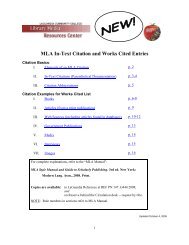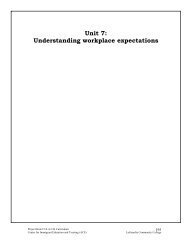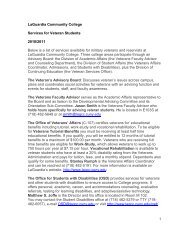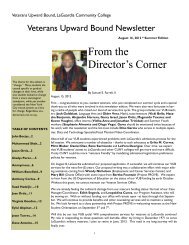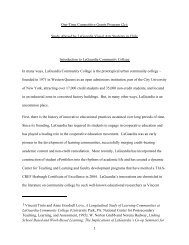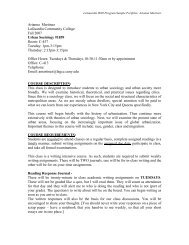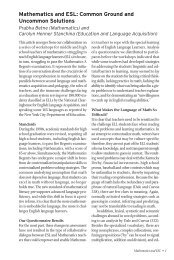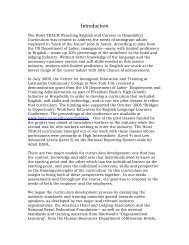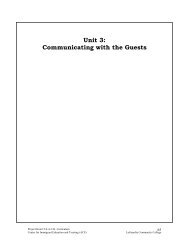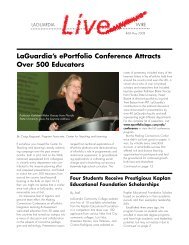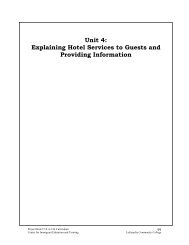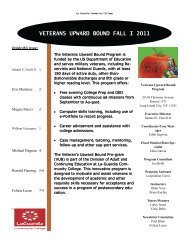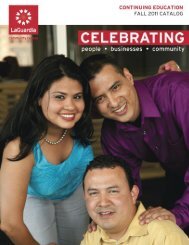COURSE INDEX - LaGuardia Community College
COURSE INDEX - LaGuardia Community College
COURSE INDEX - LaGuardia Community College
You also want an ePaper? Increase the reach of your titles
YUMPU automatically turns print PDFs into web optimized ePapers that Google loves.
Mathematics, Engineering, and Computer Science Department<br />
undergraduate research papers. Students will formulate search<br />
strategies, evaluate critically their results, modify searches accordingly,<br />
and address the ethical, legal, and social issues related to the<br />
use of information.<br />
Prerequisite: CSE099, ENA/ENG/ESA099/ENC101<br />
LRC104, Information in a Globalizing World<br />
2 credits; 2 hours<br />
The growing interconnectedness of the world and the pervasiveness<br />
of the Internet have created an ease of access to all types of<br />
global information sources. In an international context of often<br />
contradictory opinions and ideas, retrieval and evaluation of information<br />
have become more complex. This course will teach students<br />
how to access and to evaluate information critically in order<br />
to engage with diverse perspectives of 21st century global issues.<br />
Prerequisite: ENC/ENG101<br />
Mathematics, Engineering and<br />
Computer Science Department<br />
Room E218 (718) 482-5710<br />
The Mathematics Department offers a great variety of courses<br />
to students at all levels: from basic arithmetic and algebra to<br />
linear algebra, calculus and differential equations. From these<br />
courses, students gain skills and confidence for advanced work<br />
while learning to apply their course work to other disciplines.<br />
Department Faculty<br />
Kamal Hajallie, Chairperson; Mercedes Acosta, Sreedevi Ande,<br />
Yelema Baishanski, Abderrazak Belkharraz, Andrew Berry,<br />
Prabha Betne, Denise Carter, Dmitriy Chebanov, Steve Cosares,<br />
Gordon Crandall, Marina Dedlovskaya, Walter DeLaTorre,<br />
Hendrick Delcham, Abdou Drame, Anthony Giangrasso, Luis<br />
Gonzalez, Yasser Hassebo, Omar Ait Hellal, Alejandro Ibanez,<br />
Jerry Ianni, Reem Jaafar, Abdelhamid Kadik, Mangala Kothari,<br />
Mahdi Majidi-Zolbanin, , Rudy Meangru, Gerald Meyer, Natalia<br />
Mosina, Lawrence Muller, Marina Nechayeva, Yves Ngabonziza,<br />
David Peled, Jorge Perez, Yvonne Powell, Zahidur Rahman, Luis<br />
Rizo, William E. Rosenthal, Kourosh Tavakoli, Yvens Valere, Frank<br />
Wang, Paul West, Dong Wook Won, Gene Yao, Shenglan Yuan,<br />
Svetoslav Zahariev<br />
Computer Courses<br />
MAC101 Introduction to Computer Science<br />
3 credits; 4 hours (3 lecture, 1 lab)<br />
In this first course in the computer science program, emphasis will<br />
be placed on algorithmic design. Basic concepts such as selection<br />
statements, loops, character strings, arrays, pointers and file processing<br />
will be taught. Students will be required to write several<br />
programs in an appropriate language.<br />
Prerequisite: CSE099, MAT200<br />
Pre- or Corequisite: ENA/ENG/ESA099/ENC101<br />
MAC109 Introduction to Visual Programming<br />
3 credits; 4 hours (3 lecture, 1 lab)<br />
This course introduces Windows and GUI concepts and applications<br />
through objects and programming. Students will learn to<br />
develop real-world Windows applications through an event-driven<br />
language, such as Visual Basic. Additionally, students will learn<br />
basic programming concepts such as arithmetic operations, logical<br />
operations and interactive structures.<br />
Prerequisite: BTC100 or BTC101 or MAC101<br />
MAC110 Systems Analysis and Design<br />
3 credits; 4 hours (3 lecture, 1 lab)<br />
This course introduces the student to the analysis and design of<br />
computer-based systems with consideration given to organizational<br />
structures, form design, file design, data structures, scheduling,<br />
operations research techniques, and hardware and software<br />
organization. Actual and simulated case studies will be utilized.<br />
The student will develop and program a prototype and document<br />
a comprehensive systems study.<br />
Prerequisite: ENC/ENG101, MAC109 or MAC195 or MAC196<br />
MAC125 Advanced C/C++ Programming<br />
3 credits; 4 hours (3 lecture, 1 lab)<br />
This course presents object-oriented algorithmic problem solving<br />
using C++. Topics include pointers and pointer arithmetic, linked<br />
lists, memory management, recursion, operator overloading, inheritance<br />
and polymorphism, stream and file I/O, exceptions and<br />
exception handling, templates and STL, applications of simple<br />
data structures and testing and debugging techniques.<br />
Prerequisite: MAC101<br />
MAC190 Object-Oriented Programming<br />
4 credits; 5 hours (4 lecture, 1 lab)<br />
This is the second programming course in the Computer Science<br />
Program. The focus of the course will be object-oriented programming.<br />
Topics include constructors, superclasses, subclasses,<br />
strings, graphics, threads, polygons, inheritance, composition and<br />
method overloading. Writing programs to implement user defined<br />
classes will be required.<br />
Prerequisite: MAC101<br />
Pre- or Corequisite: MAT200 or MAT241<br />
MAC195 Structured Programming with COBOL<br />
4 credits; 6 hours (4 lecture, 2 lab)<br />
Algorithms discussed in this introductory course will be coded in<br />
COBOL. A structured approach will be stressed in the analysis of<br />
control break logic, sequential file updates, random file processing,<br />
ISAM programs, table handling and subprogram linkage.<br />
Prerequisite: BTC100 or BTC101 or MAC101<br />
157



